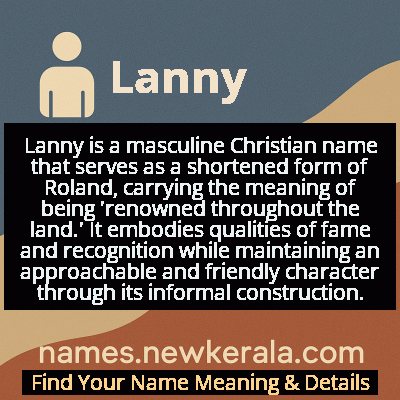Lanny Name Meaning & Details
Origin, Popularity, Numerology Analysis & Name Meaning of Lanny
Discover the origin, meaning, and cultural significance of the name LANNY. Delve into its historical roots and explore the lasting impact it has had on communities and traditions.
Name
Lanny
Gender
Male
Origin
Christian
Lucky Number
3
Meaning of the Name - Lanny
Lanny is a masculine Christian name that serves as a shortened form of Roland, carrying the meaning of being 'renowned throughout the land.' It embodies qualities of fame and recognition while maintaining an approachable and friendly character through its informal construction.
Lanny - Complete Numerology Analysis
Your Numerology Number
Based on Pythagorean Numerology System
Ruling Planet
Jupiter
Positive Nature
Optimistic, inspirational, and creative.
Negative Traits
Scattered, exaggerating.
Lucky Colours
Yellow, gold, purple.
Lucky Days
Thursday.
Lucky Stones
Yellow sapphire.
Harmony Numbers
1, 2, 9.
Best Suited Professions
Arts, writing, communication.
What People Like About You
Creativity, optimism.
Famous People Named Lanny
Lanny McDonald
Professional Hockey Player
NHL Hall of Famer and Stanley Cup champion
Lanny Wadkins
Professional Golfer
21 PGA Tour victories and Masters runner-up
Lanny J. Davis
Attorney and Political Advisor
White House Special Counsel to President Clinton
Lanny Poffo
Professional Wrestler
WWF performer known as 'The Genius'
Name Variations & International Equivalents
Click on blue names to explore their detailed meanings. Gray names with will be available soon.
Cultural & Historical Significance
Throughout the 20th century, Lanny evolved from a simple nickname to a given name in its own right, particularly in English-speaking countries where shorter, more informal names gained popularity. The name's Christian significance is maintained through its connection to Saint Roland, though it has developed a distinct identity separate from its longer form. In American culture, Lanny came to represent a certain mid-century ideal of approachable masculinity - friendly yet strong, informal yet reliable. This cultural positioning made it popular during the post-war era when values of community and accessibility were highly prized.
Extended Personality Analysis
Individuals named Lanny are often perceived as approachable, friendly, and down-to-earth. The name's informal, diminutive nature suggests someone who is comfortable in social situations and possesses a natural charm that puts others at ease. Lannys are typically seen as reliable team players who value relationships and community, reflecting the name's origins meaning 'famous throughout the land' - suggesting someone who connects well with people across different groups. They often exhibit a balanced personality that combines practical wisdom with emotional intelligence, making them effective mediators and trusted friends.
Many Lannys demonstrate resilience and determination, characteristics that echo the heroic associations of their root name Roland, while maintaining the approachable quality that their shorter form implies. This combination of strength and accessibility makes them natural leaders who can inspire loyalty and cooperation. The name suggests someone who is both grounded and aspirational - capable of great achievements but never losing touch with their roots or the people around them. This duality often manifests as practical idealism, where grand visions are pursued through steady, consistent effort and genuine human connection.
Modern Usage & Popularity
In contemporary naming practices, Lanny maintains a presence as a distinctive but uncommon masculine choice. Its usage peaked in the United States during the mid-20th century, particularly in the 1950s and 1960s, and has since declined significantly in popularity. Currently, it ranks outside the top 1000 names in most English-speaking countries, giving it a unique quality for parents seeking familiar yet uncommon names. The name continues to be used both as a given name and as a nickname for Roland, Landon, or other Lan- beginning names. Its casual, friendly sound aligns with modern preferences for approachable names, while its historical roots provide depth and tradition. Lanny appeals particularly to parents looking for names that are easy to pronounce and spell while maintaining a connection to classical naming traditions, though its usage remains relatively rare compared to its peak popularity decades ago.
Symbolic & Spiritual Meanings
Symbolically, Lanny represents approachable strength and community-oriented leadership. The name carries connotations of fame and renown from its Roland roots, but tempered with the accessibility and warmth suggested by its diminutive form. It symbolizes the balance between individual achievement and collective wellbeing - the idea that true renown comes not from solitary greatness but from meaningful connections with others. The name also embodies the concept of 'everyday heroism,' suggesting that courage and integrity can be found in ordinary circumstances and relationships. As a Christian name, it carries symbolic weight of faithful service and moral courage, reflecting the virtues associated with its saintly and heroic origins while maintaining the humility implied by its informal construction. This combination makes Lanny symbolically rich, representing both the aspiration toward greatness and the importance of remaining grounded and connected to one's community.

